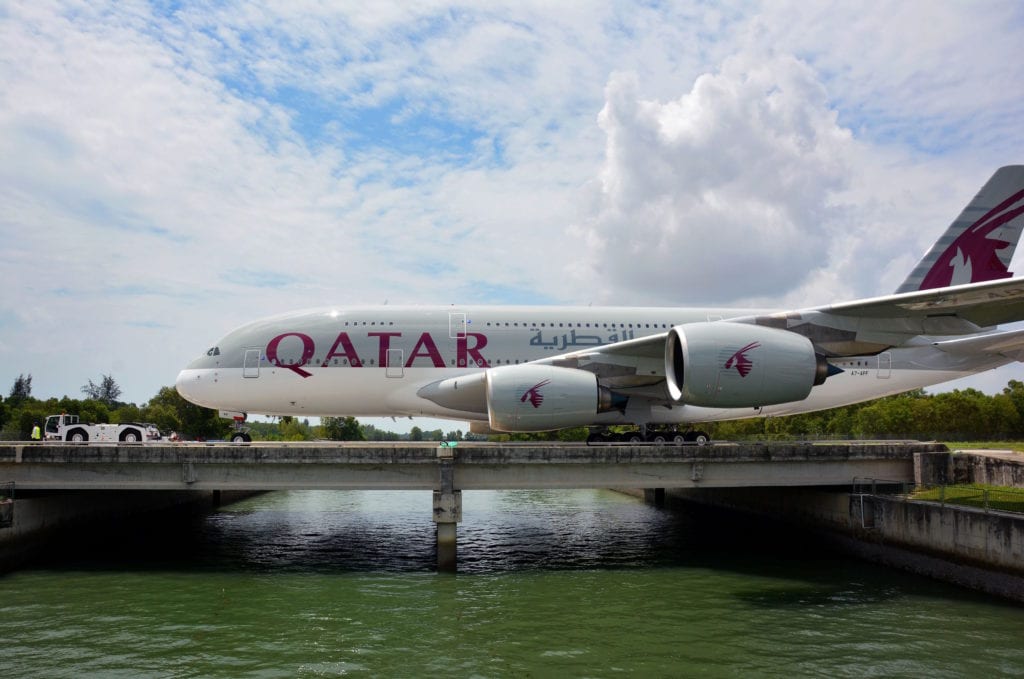
Qatar Airways A380 fleet, such as the one pictured here, will be equipped with Gogo’s 2Ku connectivity, under a deal announced at the 2019 Dubai Airshow. Photo: Airbus
Prominent Middle eastern carriers, including Emirates, Middle East Airlines and Qatar Airways among others made significant investments in new in-flight connectivity, digital analytics and avionics upgrades during the first two days of the 2019 Dubai Airshow. Here, we provide a look at some of the highlights of those deals that allude to the continuing trend of operators investing in technologies that digitally transform the way they fly and maintain their aircraft.
On the connectivity front, Qatar Airways surprised the connected aircraft ecosystem by becoming the first airline in the Middle Eastern region to adopt Gogo’s 2Ku in-flight connectivity service. Under the agreement, published in a press release by Gogo on Nov. 19, the airline will install 2Ku connectivity and live television across 70 of its in-service aircraft. According to Gogo, Qatar will be upgrading its fleet of Boeing 787-8, 787-9 and Airbus A380s with the new technologies.
The upgrade will involve the replacement of antennas, along with the installation of new modems, wireless access points (WAPs) and new line replaceable units needed to enable 2Ku across the targeted fleet. Qatar Airways CEO Akbar Al Baker remarked on being able to provide passengers with “an excellent connectivity experience with Gogo 2Ku.”
“Having access to the internet, and being connected and available is critical for passengers, and the demand for bandwidth will only increase,” Al Baker said.
Qatar’s investment in Gogo is the airline’s second major connectivity investment in recent years, after becoming the first Middle Eastern carrier to start operating what it describes as “Super Wi-Fi,” with Inmarsat’s GX Aviation connectivity in 2018. GX connectivity, enabled by Honeywell’s JetWave satellite communications hardware – which includes a Multi-Channel Satellite (MCS) terminal, antenna controller, modem and router hardware, and a tail-mounted antenna dual receivers – is featured across a combined fleet of 130 Airbus A350s and Boeing 777s operated by Qatar.
Ashi Hoseini, manager of Electronic Flight Bag (EFB) systems at the airline, recently said in an interview with Via Satellite that the airline is also paying close attention to the future potential promised by low earth orbit (LEO) satellites and would like to see their use of connectivity eventually support artificial intelligence and machine learning applications.
Emirates, another major Middle Eastern carrier also known for investing in the newest connectivity, made another type of acquisition in Dubai this year. Emirates is adopting GE Aviation’s electronic Flight Operations Quality Assurance (eFOQA) and Flight Pulse data analytics platforms for its A380 and B777 pilots.
GE describes FlightPulse as a mobile application that uses aircraft data and “smart analytics” to enable pilots to access their own flying metrics and trends. Pilots can see and review snapshots of their performance at takeoff, cruise, landing, descent and ascent at different times to see where they could be saving fuel.
The eFOQA service being adopted by Emirates is designed to use “flight data generated by the aircraft and its systems and applies proprietary data management and analytics technology to help Emirates better manage their fleet, providing previously unavailable insight into their operations,” according to GE.
“We are keen on having pilots review their performance and become more active in achieving best safety standards while optimizing operations,” said Capt. Hassan Alhammadi, Divisional Senior Vice President of Flight Operations for Emirates.
Boeing also received interest for airline investment in digital upgrades in Dubai this year. South African low cost carrier FlySafair signed an agreement to join more than 300 other airlines using Boeing’s Maintenance Performance Toolbox. The technology is described by Boeing as an online system capable of generating two and three-dimensional (3D) graphical user interfaces, combined with advanced data mining and search capabilities, to improve the way airlines locate and access relevant maintenance information on-demand.
Inside the cockpit, Middle East Airlines (MEA) selected Honeywell Aerospace to supply an integrated avionics suite for its new purchase of 11 Airbus A321neos, four A330neos and four A321XLRs. MEA’s new Airbus fleet will be equipped with Honeywell’s integrated multi-mode receiver, IntuVue RDR-4000 3D weather radar, Pegasus II flight management system and enhanced ground proximity warning system.
Lebanon’s state-run airline will also equip the new aircraft with an emergency locator transmitter (ELT) and traffic collision avoidance system Mode S transponder from Honeywell.
“Our avionics portfolio helps airlines create a path towards future EASA and FAA safety mandates and provides pilots with crucial flight information in the most efficient way possible. This makes it easier for them to select optimal routes and navigate inclement weather,” said Raghed Talih, the head of Honeywell’s Middle East Aerospace division.